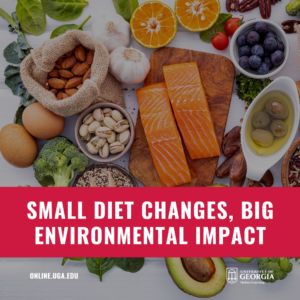Small Diet Changes, Big Environmental Impact
Small Diet Changes, Big Environmental Impact
UGA Online’s Professor of MS in Nutritional Sciences Emma Laing recently shared her perspective on the effects of small diet changes on the planet in a U.S. News article.
The article explores the benefits of dietary alternatives on the health of consumers and of the planet. It shared that making small and simple changes can reduce the average American’s carbon footprint by more than 35%. In order to see these effects, everyone will have to face choices of substitution, but effects will make huge strides in the fight against climate change.
more than 35%. In order to see these effects, everyone will have to face choices of substitution, but effects will make huge strides in the fight against climate change.
Professor Laing shared that most Americans are not meeting the recommended fruit and vegetable intake. Laing said, “having access to safe, nutritious and affordable foods within our food system – while conserving resources involved in production, destruction, and consumptions of foods – are important for both our health and the health of the planet.”
The article supported both Laing’s comment and the argument for making these substitutions with survey data they collected from 7,700 adults and children. The survey looked into four broad food groups and specifically focused on substituting high-carbon-impact food with more sustainable options. The survey results showed that switching from proteins like beef to tofu could reduce footprints by 50% and milk substitutes could reduce personal footprints by 8%.
Getting an entire population on board with these substitutions is no small task, but the article said it can be as simple as switching the protein you order in your burrito at lunch.
It may not always be easy to see the impact that small decisions can make on the world around us, but when we come together to learn about the impact of our decisions, big changes are possible. Studying and understanding the role of Nutritional Sciences in our daily lives can help see the possibilities of these little changes. Be part of that difference with a graduate degree program in Nutritional Sciences.
Written by:
